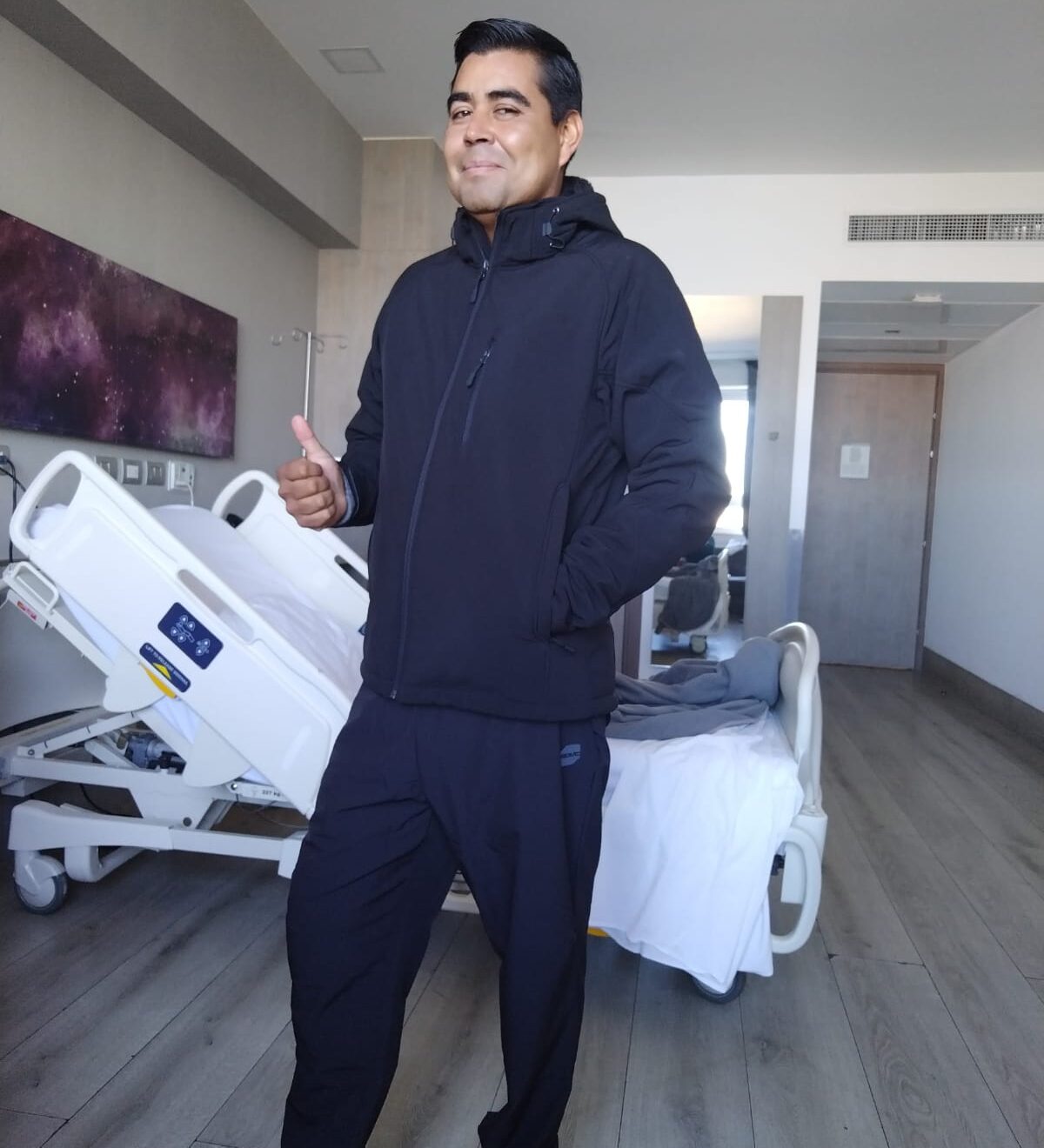Herpes Simplex Virus Encephalitis – Ismael’s story, told by wife, Rosa

This story about my husband’s journey through HSV encephalitis. It began on November 5th of 2024 at 12:00pm with a text message telling me “I feel sick, the right side of my face and my right arm are numb”.
How it started
When I arrived home, my husband was sleeping and had fever of 38°C (100.4°F), so I gave him paracetamol and took him to hospital. There the doctor told us that the numbness was due to the throat being very swollen and pressing on the facial nerves and the fever was due to infection. He gave us the corresponding antibiotic and told us if we didn’t see improvement in 24 hours, we would return to the hospital. My husband was restless all night and nothing in the world prepared us for what was going to happen next day.
At 7:30am I asked my husband if he would go to work that day, and he said no, he still felt sick. But at 9:00am I went to check him, and he was again with fever, he got up and took a shower. When he returned to bed, he told me in a reproachful tone “You shouldn’t have given me that injectors”, alluding to three antibiotic injections I gave him on November 2, 3 and 4, as prescribed by another doctor for a sore throat. When I heard him, I was worried about the change of words, but I attributed it to the fever. But I really got scared when he began with oral automatisms like lip smacking, chewing, and swallowing. So, I told him we needed to go to hospital but he rejected me and said, “I’m asleep, I’m asleep, I’m asleep.” I called to my mother-in-law and she forced him wake up and told him to come on to eat. As he ate, he babbled something incomprehensible. We decided to take him back to hospital telling them that he was worse than before and still has a fever.
My husband was incoherent and spoke single phrases with no relationship between them. The doctor told us that my husband had sensory aphasia and it could be due to CVA or encephalitis, and that he would order the corresponding laboratories and an MRI.
At 7 pm, they told us that it was herpes simplex encephalitis and it has treatment but is very delicate if it is not treated in time, He will have to stay hospitalized for a week with intravenous acyclovir.
Transfer and more tests
However, when a family friend found out the diagnosis, he advised me to take my husband to a larger hospital that has an excellent Neurologist Department. Overnight Ismael was very restless, with fever and aphasia, and early morning I did the process for transfer my husband.
At the new hospital they made other laboratory studies, MRI, encephalogram, chest x-rays and a lumbar puncture. The Neurologist confirmed previous diagnosis, but she told me that comparing both RMI, the temporal lobe inflammation was bigger than of previous day. So, she decided to administer acyclovir, steroids and antipyretic medication at the maxim dose.
Ismael stayed in ICU for 42 hours, because he moved his arms a lot and hurt himself where the intravenous catheter was placed, so he had to be tied up. The good news was that 24 hours after being admitted to the ICU, the aphasia disappeared, but he began to show problems in short-term memory, also he couldn´t remember objects and people names.
Ongoing symptoms
We stayed in the hospital for twelve days. During that time, we realized that my husband had lost his smell and taste senses. We´re discharged from the hospital on November 19 and a new change was coming. Upon returning home, my husband hoped to resume his activities and lifestyle prior to the illness. But the reality was that extreme fatigue made him sleep several times a day. Going to visit family was very overwhelming as he couldn’t keep up with the conversations. This made him isolate himself from the outside as well as make him quieter. Other physical changes were that because of losing 14 kg (30.86 lb) in the hospital, there were days when he felt very cold, also, he started to be more irritable due to his memory problems, fatigue and anosmia persist.
Currently, he is still receiving treatment for seizures, short-term memory failures still occur, and in this last consultation he was diagnosed with depression. It has been very difficult for him deal with the physical and memory limitations. He has already started his medication for depression, and we are waiting for a consultation with the neuropsychologist to start working on the memory problems.
For me, as his wife, has been a challenge to adapt the new family dynamics with the illness. My advice to all of us who have a family member with encephalitis is that as primary caregivers we take care of our physical and emotional health. In my case, I had to attend psychotherapy and take medication for depression and anxiety. Since I felt overwhelmed by having to control multiple medications and several doses a day, as well as take care of food preparation, my job, my children, and my husband’s mood swings. Thinking all the time what if he has a relapse because of me, and if I’m not taking good care of him. Also, crying or scolding for no reason.
The last straw was that I got sick with the flu and all I thought was, “I’m going to die, what’s going to happen to my children?” Then I started crying. And that’s when I realized that something wasn’t right with me and that’s how I scheduled a consultation with a psychologist, who referred me to an internist. Thanks to the fact that I realized how quickly they gave me medication, I’m now more controlled and can handle everything that happens in the best way. To take care of someone else, we must first take care of ourselves. Another thing that helped me a lot was having found the Encephalitis International website, there I found information that helped me understand that everything that happened to Ismael in his recovery was normal and not an indication of relapse. Thanks to those who make the operation of this website possible and to all those who have shared their valuable testimonies.
If you would like support for encephalitis please get in touch.
Published May 2025
Get help
Our support team are available from 9am to 5pm (GMT), Monday to Thursday, and 9am to 4.30pm (GMT) on Fridays.
To get in touch, simply call +44(0)1653 699599.
Contact our helpline
